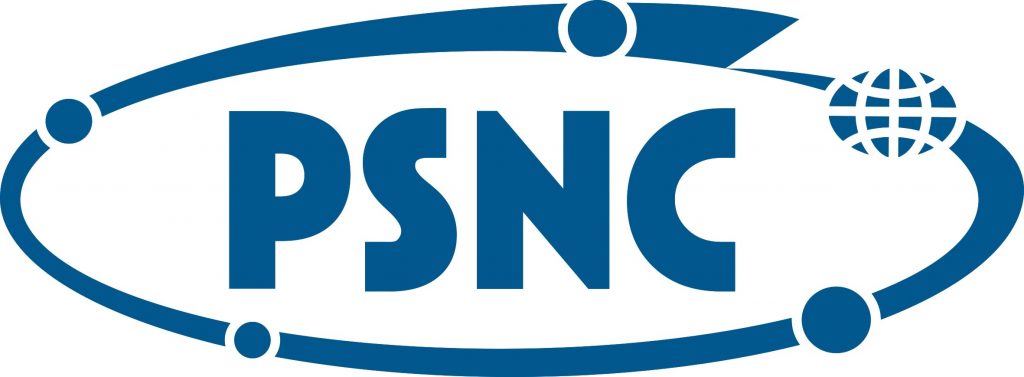
Poznań Supercomputing and Networking Center (PSNC)
Description of the organisation
Poznan Supercomputing and Networking Center (PSNC), affiliated to the Institute of Bioorganic Chemistry of Polish Academy of Sciences, is one of the leading research and computing centres in Poland. PSNC focuses on using, innovating and providing HPC, grid, cloud, portal and network technologies to enable advances in science and engineering. It hires around 300 people and is organised into 4 main technical departments: Applications, Supercomputing, Network Services, and Networking Department. PSNC is a coordinator of PIONIER – the Polish Optical Network and as such is a partner of the GEANT network. It also operates one of 5 national HPC centres in Poland. On top of the existing infrastructure PSNC has developed a large number of innovative tools, services and applications. PSNC has been involved in a large number of R&D projects including: FET HPC ESCAPE & ComPat, H2020 M2DC (coordination), FP7 FiPS, DOLFIN, CoolEmAll (coordination), COST actions such NESUS 1305, PRACE initiatives, and many more.
Over the past few years persons from PSNC engaged in the RECIPE projects have published multiple papers on the subject of the low-level analysis of performance execution, performane- and energy-aware scheduling and the analysis of interactions occurring between different types of applications. Additionally, PSNC has developed multiple tools to monitor and analyse the parameters of the running applications.
Role in the project
PSNC will lead WP1 responsible for requirements analysis and application integration. In particular, PSNC
will use, develop and adapt the application for modelling energy prediction by renewable energy sources
based on local weather forecasts. PSNC will also contribute to the development of resource management
techniques in T2.2 and support predictive reliability developments by contributing with analysis of
monitoring data to T3.1, with thermal models and simulations to T3.3, and application characterisation to
T3.4. PSNC will also take part in scientific dissemination and exploitation of project results in WP5..
Short profile of staff members carrying out the proposed research and innovation activities
Ariel Oleksiak, Ph.D., is a head of the Energy-efficient ICT Department within Application Division at Poznan Supercomputing and Networking Center (PSNC) in Poznań, Poland. He received his M.Sc. degree in Computer Science, Intelligent Decision Support Systems, from the Poznan University of Technology, Poland in 2001 and PhD in Computer Science from the same institution in 2009. His research interests include mainly energy efficient technologies, distributed systems, resource management & scheduling, and simulations. He has actively contributed to many research projects including coordination of EU-funded projects: CoolEmAll – dealing with energy-efficiency of data centers and M2DC – developing a modular, highly efficient, cost-optimized server architecture composed of heterogeneous microservers. He has been also a member of the management committee of the European COST Actions IC0804 and IC1305 in which he was a chair of the energy-efficiency working group.
Michal Kulczewski, works in the Applications Division at Poznan Supercomputing and Networking Center since 2005. He received his M.Sc. degree in Computer Science, Computer Network and Distributed Systems, from the Poznan University of Technology, Poland in 2005. His research interests include mainly numerical weather predictions, modelling air quality in urban environments, code optimization, programming multi- and many-core computing systems, advanced in-situ data analysis and visualization. He has actively contributed to many EU and national projects such as InteliGrid, ACGT, BREIN, OGF-Europe, POWIEW, PL-Grid+, ESCAPE.
Wojciech Szeliga, received his M.Sc. degree in Mechanical Engineering from Poznan University of Technology in 2014. His master thesis was referred to numerical examination of disturbance propagation in an airflow around a delta wing. He participated in grant of National Research Center related to novel methods of modal analysis in fluid flows. At present he realises his PhD studies at Poznan University of Technology, related to fluid flow modal analysis and turbulence modelling. Since 2014 he has been working in the Applications Division at PSNC as a system analyst and researcher. His research activities concern numerical examination of cooling systems' efficiency in server rooms' with OpenFOAM software. At work he is also dealing with development of numerical simulation software, based on Eulag application, dedicated to forecasts of renewable energy production.
